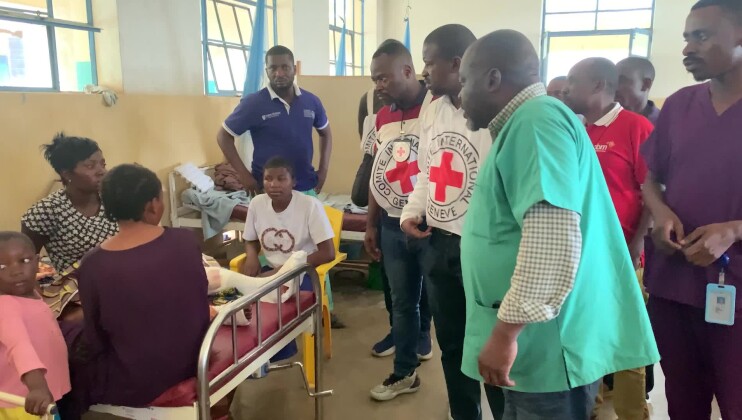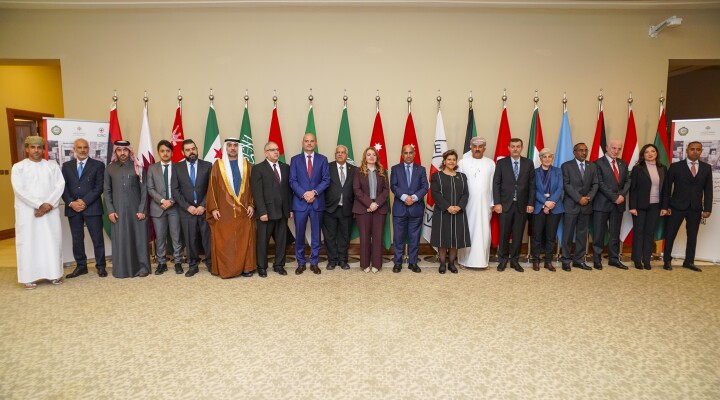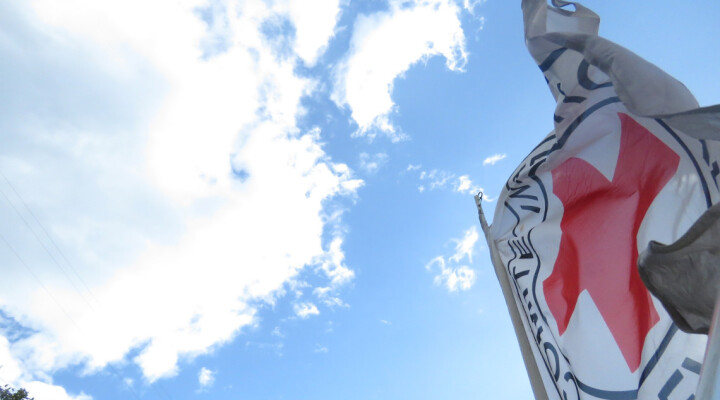Millions of people living through the horrors of conflict and war are now pushed to the brink of survival by COVID-19
The ongoing economic and food security impact of COVID-19 is massive and appears likely to worsen over time. In countries affected by conflict, millions already live with little or no healthcare, food, water and electricity, as well as volatile prices and destroyed infrastructure. COVID-19’s impact could set in motion a vicious circle of lost income, deepening poverty and hunger.
Narjas, a small business owner in Libya, who sews bags to sell to bakeries, saw her business fail, “I was planning to expand my business and buy a new machine, but because of the coronavirus I can no longer buy the fabric I needed, and the bakery will no longer buy my bags because of fear of the disease.”
Narjas has now received a loan from the International Committee of the Red Cross to rescue her business. This is a welcome relief, but without a coordinated response from governments, international institutions and humanitarian and development actors, her business, and millions of others like hers, will fail leading to poverty, hunger and destitution.
Nazha Motee’ El Hallaq, a Syrian refugee, who runs a small hairdressing salon from her home in Aarsal Lebanon watched her earnings dwindle due to the COVID-19 pandemic. “I had a lot of work and then suddenly, the outbreak of coronavirus happened. Physical distancing measures took place and movements were very limited” she said.
The typical coping mechanisms that families use to overcome lean times, asking for loans from neighbours or family members, reducing non-food purchases, using savings, have been exhausted for many. The hardest-hit households were already food insecure, with physical access to food markets restricted due to COVID-19 for the most vulnerable.
The impact of COVID-19 on farmers in Borno state in North East Nigeria has been devastating. Social distancing and the lockdown meant households were not able to go out to buy, or generate the income, to buy seeds.
According to Ibrahim Mohammed, a displaced farmer, “We couldn’t go out anywhere because of COVID-19 and we couldn’t do any business. We stayed home and suffered from hardship.”
According to Elisha John, an Economic Security assistant at the ICRC, “Without the seeds planted, they are not going to have food for their household consumption, leading to serious challenges. We want to ensure that people go back to their farms to plant the seeds.”
The ICRC has responded by providing seeds to 20,000 vulnerable households, and another 16,000 will benefit from this support next week. As well as seeds, farming communities receive cash to enable them to buy food, while working the land.
Worryingly, chronic undernourishment and COVID-19 are mutually reinforcing, as previous outbreaks — Ebola, SARS, MERS — have negatively impacted food security, increasing malnutrition rates. Plus, income shortages could hit families at a time when countries struggle to provide essential services, deepening food insecurity for people already at risk. When movement restrictions are imposed, people face a dire choice between earning a living and protecting their health.
Without concerted action from the global community, we expect humanitarian needs to deepen and worsen, with new short- and longer-term health and protection needs emerging and otherwise relatively resilient communities starting to need assistance.
The ICRC calls for social protection programs to be maintained or increased, and that they include the most vulnerable. Existing humanitarian activities focused on food security and nutrition must also be reinforced.
Facts & Figures
Early indications in countries where the International Committee of the Red Cross operates shows the vast impact of COVID-19:
· In Nigeria, 95% of people in a 313-person ICRC survey said their livelihoods have suffered because of COVID-19, resulting in reduced salaries or revenue. In Iraq the number was 83% (of 130 people); in Libya, the number was 52% (of 190 people).
· In Iraq, 77% interviewed reported having no savings to cope with the crisis; in Libya it was 85%; in Nigeria 48%.
· In Ukraine, 75% of 215 people interviewed reported an increase in the price of basic items, while 47% reported a reduction in market access.
· In Latin America, lockdown measures have had a negative impact on Venezuelan migrants, preventing them from earning an income that covers their basic needs.
For further information, please contact:
Anita Dullard, ICRC Geneva, contact: +41 79574 1554, adullard@icrc.org
Jason Straziuso, ICRC Geneva, contact: +41 79 949 3512 jstraziuso@icrc.org
SHOTLIST
Location: various
Length: 08:15
Format: HD mp4
Camera: various
ICRC ref: 20200602-Ecosec_COVID
Filming date: various
Copyright: ICRC access all
00:00 Street vendors and market stalls, Marib, Yemen, April 2020
00:17 Wholesale market area, Taiz, Yemen, April 2020
00:25 Taiz city scenes showing destruction, Taiz, Yemen, April 2020
00:40 Drone shots of urban destruction, Homs, Syria, 2019
00:54 Majida in her kebab restuarant funded with the support of a grant from the ICRC and Syrian Arab Red Crescent. She is 50 years old, a mother of two girls, and looks after her disabled husband, Homs, Syria, 2019
01:19 Narjes, whose small business is supported by the ICRC, in her sewing workshop, Tripoli, Libya, 2019
Soundbite, Narjes
01:37 “After COVID-19, the project failed due to many reasons. First the fabric shops were closed, so I lost my suppliers. Even when I managed to get fabric, I couldn`t sell the bags to the bakeries, because they refused to buy them out of fear of the disease.”
02:03 “The impact was massive. I was planning to expand the project, buy new machines, and develop my skills. I wasn’t able to because of COVID19. Now I don’t have an income.”
02:36 Nazha Motee’ El Hallaq, a Syrian Refugee who received support from the ICRC and British Red Cross to run her hairdressing business, Aarsal, Lebanon, May 2020
Soundbite Nazha Motee’ El Hallaq
02:58 “I have a child with special needs. She is my niece. Her father is detained in Syria and her mother and sisters are missing.”
03:04 “I am also raising my other brother’s children. Their mother passed away and their father left them.”
03:09 “Thankfully I had a lot of work and then suddenly, the outbreak of coronavirus happened. Physical distancing measures took place and movements were very limited.”
03:18 “When self-isolation started taking place and we found ourselves in the house not being able to move around, it reminded me of a time when we were in Syria and we had to stay home because of the shelling and bombing.”
03:28 Support for the community returning to their village, after 5 years of displacement. Footage shows social distancing measures put in place during a cash distribution, Ayashat, Iraq, May 2020
04:07 IDP Camp in Maiduguri, Nigeria, 2019
04:26 Seed distribution site, Maiduguri, Nigeria, May 2020
Soundbite: Ibrahim Mohammed, displaced farmer in Maiduguri, Nigeria
04:56 “We couldn’t go out anywhere because of COVID-19 and we couldn’t do any business. We stayed home and suffered in hardship.”
05:10 “With the support I am going to receive, I will farm and use the produce to eat with my family.”
05:21 Women arriving at seed distribution site, Maiduguri, May 2020
05:29 Vulnerable families receiving cash, Maiduguri, May 2020
Soundbite Elisha John, Economic Security assistant, ICRC
05:48 “Without the seeds planted, they are not going to have food for their household consumption and it is going to be a serious challenge. So for us, we are going back to the community to ensure that people go back to their farms to plant the seeds.”
06:05 Peruvian Red Cross and the German Red Cross deliver food to 250 vulnerable families from 6 communities in the San Antonio de Chaclla District, Lima, Peru, May 2020.
06:35 ICRC supported bakery training in Caracas, Venezuela, 2019
07:05 Distribution of food and hygiene kits to the community in Donbas, Ukraine, March 2020
Soundbite from pensioner, Tamara from Donetsk, Ukraine
07:21 “Our pensions are not enough. These boxes will help us to survive for a while. We don’t sleep at night. We have become stressed. Our blood pressure goes up with all this fear.
07:36 GVs of Tamara with her boxes of food and hygiene items.
07:48 ICRC and Sri Lanka Red Cross Society carrying out an island wide distribution of food and aid to some of the most vulnerable families, Sri Lanka, May 2020
08:15 ENDS



